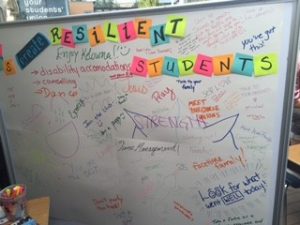
CREATE, Sept 2016
Our Health and Wellness team has been giving away star-shaped stress balls at a number of orientation-related events the last little while. Have you seen them? These bright yellow stars were intentionally designed to say “I am resilient” on one side because we hope that, as a student, you remember that you are resilient when you face the various challenges of university life.
Yes, you will face challenges–maybe even several! Just remember you can face those challenges using the many strengths and coping strategies you already have. Being resilient doesn’t mean having a problem free life; and it does it mean toughing things out on your own. It means learning to manage setbacks in healthy effective ways so that you can get back on track and refocus on your academic and personal goals. Being resilient means that you see problems such as failing an exam, arguing with a roommate, or feeling lonely as temporary and changeable.
We’ve talked with many UBCO students over the years, and this is what they say helps them be resilient:
Get involved
Try to find value in more than just your marks. Get involved in clubs, course and student unions, intramurals, the Academic Involvement Centre, or anything on campus that interests you. Finding value and connection in different areas means that when you face a setback in one area of life you can still feel positive about another area of life.
Set realistic expectations
Expectations can be a useful way to motivate yourself; however, setting unrealistic expectations (e.g. I must achieve 90% in every course) results in feelings of defeat and failure. Ensure your expectations are possible and flexible in the event that life gets in the way.
Take care of yourself
Maintaining healthy eating, sleeping and exercise habits can have a big effect on your health. Sleep, diet and exercise give us the energy we need to manage small life stressors.
Manage your emotions
Managing emotions means recognizing when you are overwhelmed and learning to calm yourself down. Start by taking a deep breath. Avoid making any big decisions until you are in a calm state.
Help others
Helping others means shifting the focus from ourselves to someone else. This can make us feel more connected to others and our place in the world feel more meaningful.
Use your strengths and assets
Students are often so focused on improving that they forget to use what they are already good at. Take time to identify your strengths and assets. Using these daily builds confidence and helps us remember that we are capable, worthy people.
Laugh lots!
Humour can make any situation better. Is it possible to see the funny side of the problem? Find opportunities to make yourself laugh.
Avoid unhealthy coping strategies
Isolating, avoiding, and misusing alcohol and drugs are strategies people use to try to avoid pain. This may provide temporary relief, but eventually will make the problem worse.
Be kind to yourself
You likely will make a mistake or two this year, and may even feel ashamed or discouraged. Accept this and treat yourself with compassion. Treat yourself as you would a friend who made the same mistake.
Accept: “it is what it is’
We tend to fight against distressing thoughts and feelings trying to “will them” away. This struggle only serves to cause increased distress. There are some situations we just can’t change. Try to accept these feelings rather than avoid them.
If you’ve discovered strategies that you find helpful and would like to share them with us and/or other students, we would love to hear from you! Just comment below 🙂